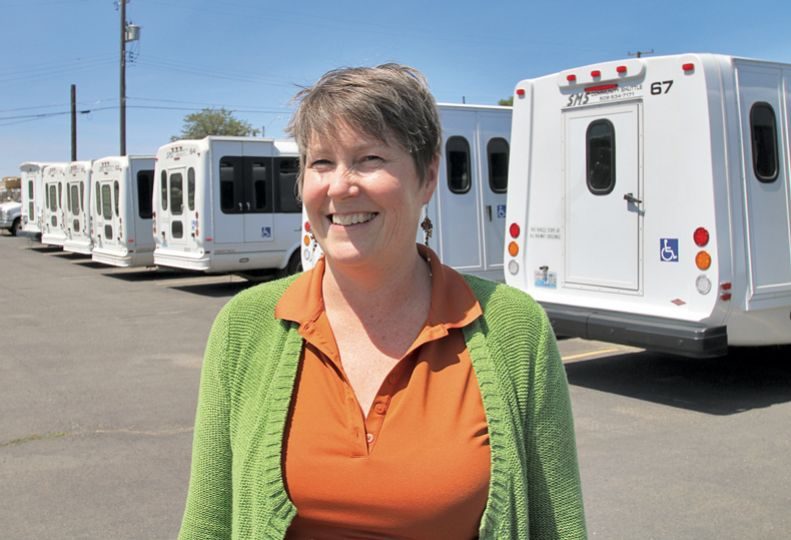
Home » Study explores seniors' transportation challenges in Spokane
Study explores seniors' transportation challenges in Spokane
Nonprofit seeks to identify number of elderly in need

August 3, 2017
The Spokane office of nonprofit Special Mobility Services Inc. is in the early stages of using a $160,000 grant to study what it suspects are widespread, unmet transportation needs of senior residents living in Spokane County.
The grant, which will go toward what’s called the Spokane County Mobility Management Project, is funded by the U.S. Department of Transportation. The federal agency presented the Spokane Transit Authority with the grant last year.
For its part, Special Mobility contributed an additional $40,000 toward the study, says Betsy Pozzanghera, who Special Mobility hired in April with grant money. Funding for the grant is scheduled to run until near the end of 2018, with Pozzanghera compiling research for the study.
“We know that there are people who don’t qualify for (STA) paratransit services because they’re not on disability or Medicaid,” Pozzanghera says.
“What we don’t know is how many. So far, anecdotally, what I’m hearing is that there are a lot. A lot of seniors, many of whom are also disabled, just don’t have a way to get around,” she says.
The project’s goal also is to find such individuals, educate them about currently available transportation options, and create a plan among their family members and care providers to get them the rides they need, she says.
Special Mobility, located at 3102 E. Trent, serves as Medicaid’s transportation broker and operates in 10 Eastern Washington counties, including Spokane, Adams, Asotin, Ferry, Garfield, Grant, Lincoln, Pend Oreille, Stevens, and Whitman. The nonprofit is based in Portland and also has an operation in Eugene, Ore.
Special Mobility has operated here since 1981. It employs about 20 people working at its Trent Avenue location. Its vehicle fleet of more than a half-dozen shuttles is kept at 707 N. Napa.
A half-dozen drivers and two other employees—one of whom is Pozzanghera—operate out of the Napa Street location, Pozzanghera says.
As a Medicaid transportation broker, Spokane Mobility sets up free transportation for Medicaid clients who are attending medical appointments paid for by Medicaid and who have no other means of transportation. The organization can arrange for clients to be transported by public transit, commercial service providers, social service agencies, or volunteer drivers, Pozzanghera says.
On average, Spokane Mobility provides more than 200,000 rides per year to its Medicaid clients.
In 2014, the Spokane Regional Transportation Council teamed with Spokane Transit and put together a report called the Coordinated Public Transit-Human Services Transportation Plan, which aimed to improve transportation services for older adults, those with lower incomes, and people with disabilities.
The survey showed there are at least 20 companies and organizations, both for profit and nonprofit, in Spokane County that provide transportation for senior citizens.
However, the survey also said, “Several of these providers offer transportation only to specific client groups, charge for their services, or restrict use based on specific eligibility requirements.”
It added, “Spokane Transit Authority is the only service open and affordable to all members of the general public. However, STA’s service area doesn’t extend throughout Spokane County.”
Ron Uzeta, owner of Spokane-based Gopher LLC, which assists seniors and professionals with services ranging from scheduling to running errands, says he’s tried to dedicate part of his business to helping seniors with transportation. However, he says he recently stopped that part of his small business because it was losing money.
“As a small business, after a while, I just couldn’t make it work,” Uzeta says. “I feel so bad for so many seniors because they need help getting groceries and getting to their doctors appointments. I want to continue to do this part of the service, but I just need to take a timeout and figure out how to do it.”
Pozzanghera says she’s repeatedly heard the sentiments Uzeta expressed, which has mostly come from retirement home employees, regarding how difficult it can be to find transportation for seniors.
“I’ve talked with discharge nurses and staff at local hospitals who have said that it’s not uncommon for them to spend as much as 40 percent of their shift trying to arrange for transportation for elderly patients,” Pozzanghera says.
By the end of summer, she says, she wants to have a better idea as to the total number of people in Spokane County who have unmet transportation needs. From there, she says her role will be to help current transportation providers come up with ways to be able to better serve seniors.
Latest News Special Report Government
Related Articles
Related Products




